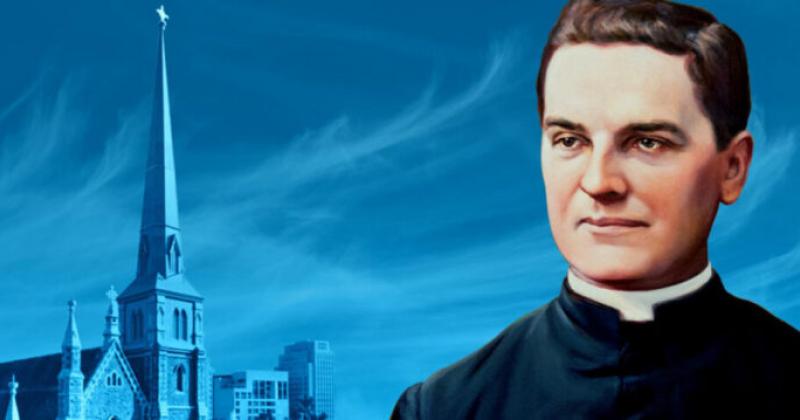The saints are not really like you and me. But Father Michael McGivney comes very close, and for that reason, he will be an attractive patron for parish priests.
A clarification: There are no canonized saints who are like you and me. The vast majority of all those in heaven were very ordinary. But to be beatified or canonized, there has to be something sufficiently noteworthy to prompt someone to undertake the arduous canonization process. Thus, most candidates are martyrs, or founders or foundresses, or endured remarkable illnesses, or did something in life sufficiently extraordinary to get the attention of others — like starting an online catalogue of Eucharistic miracles and dying young, offering your sufferings for the pope. That is the story of the Church’s newest Blessed, Carlo Acutis.
Father Michael McGivney, the U.S. parish priest who will be beatified on Saturday, the vigil of All Saints, was more or less a typical parish priest. More, because he did nothing out of the ordinary for parish priests. Less, because he founded the Knights of Columbus, without which no one would have ever heard of him, let alone proposed him for beatification. He would have been like his two brothers who became priests; unknown to history, known to God.
“Father McGivney is a model of the day-to-day, blue-collar holiness to which every parish priest is called,” writesmy friend Father Roger Landry. “He wasn’t St. Augustine in the pulpit, St. Thomas in the classroom, St. Charles Borromeo in administration, or St. Pio in stigmatized prayer. He was Father Michael McGivney, but sought to respond to his priestly vocation and the work given him with the same wholehearted devotion as the others.”
And if I might add, he wasn’t St. Jeane-Marie (John) Vianney in the confessional or St. Maximilian Kolbe in the death camps.
Blessed Michael’s feast day has been set for Aug. 13, the day between his birthday in the world (Aug. 12, 1852) and his dies natalis, birthday in heaven (Aug. 14, 1890). Usually a feast day is set for the death date, but Aug. 14 is already the obligatory feast day of St. Maximilian, so Blessed Michael’s would never be observed; Aug. 13 has no obligatory feasts.
There is something more, though, about that date, as it falls between the feast days of the patron saint of parish priests, St. Jean-Marie Vianney (Aug. 4) and Maximilian Kolbe, whose last recorded words were “I am a Catholic priest” — a sufficient explanation, he thought, for his offer to exchange his life for another prisoner.
I will confess that, though having spent my entire priesthood in parishes and most of those as a country pastor like the Curé of Ars, I have never felt a particular devotion to St. Jean-Marie Vianney. It is easy to admire him and invoke him as an intercessor, but his life seems impossibly distant from the ordinary life of a parish priest. We don’t wrestle with the devil, we don’t fast on a potato a day, and we don’t have people queuing up for days to go to confession; to be honest, many parish priests would be happy to have a confessional queue that stretched to an hour or so.
St. Maximilian is a special patron of mine, for two reasons. One is that his baptismal name, the name his mother called him, is Raymond, so I take him as my name-day saint. The second is that he was a journalist. But that is as far it goes in terms of my life being comparable to his. The Franciscan friary he founded was one of the largest religious houses in the world, he published a magazine that reached more than 10 per cent of all the households in Poland, he traveled as a missionary to Japan — and all this before his heroic martyrdom in Auschwitz.
Sts. Jean-Marie and Maximilian are powerful intercessors for priests and inspiring witnesses, but as models their lives were remote from what parish priests daily experience.
Father McGivney, by contrast, lived his parochial life heroically in a manner not altogether different than many priests today do. He visited the sick and imprisoned, including a man who returned to the faith before his execution through Father McGivney’s ministrations. He led activities for youth and helped the poor families in the parish. Even the founding of the Knights of Columbus was not wholly different from those priests today who initiate programs for the corporal works of mercy. He was concerned for the Catholic identity of his flock in a hostile culture; in the late-19th century, it was Protestant bigotry; in the early 21st, it is secularist fundamentalism.
Father McGivney died before the Knights of Columbus were a decade old; he would do far more for the growth of the order from heaven than during his short 38-year life. Thus, while founding the Knights is the reason his cause was put forward, his life of holiness can be considered apart from that. It cannot be considered apart from his parochial mission. The authoritative biography of McGivney was entitled, for good reason, Parish Priest.
When next August rolls around, and parish priests celebrate their official patron, Jean-Marie Vianney, and Maximilian Kolbe, whom St. John Paul II called the “patron of our difficult century,” I expect that more than a few will now celebrate Aug. 13 as a new feast day for parish priests.
